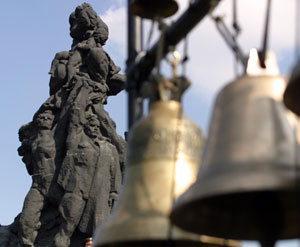Ukrainian society and the Holocaust

On January 27, 1945, Soviet troops seized the Nazi death camp of Auschwitz-Birkenau in Poland where over 1.5 million Jews had been killed during the war. Since then this date has been observed as the International Holocaust Remembrance Day, including of course in Ukraine, considering that a great many Jews from Halychyna (Galicia), Naddniprianshchyna (Dnipro Ukraine), and other regions of Ukraine, which they regarded as their homeland, met their death in Nazi concentration camps.
This year’s Holocaust Remembrance Day is dedicated to the children who were tortured to death by the Nazis, all those boys and girls destined to experience the mind-boggling horrors of that misanthropic regime. Many were made orphans, many were killed by disease and body injuries. There is no telling what contribution these children would have made to our civilization, had they survived. In fact, this was the topic of the roundtable “Ukrainian Society and Holocaust Remembrance: Scholarly and Education Aspects,” organized by the Ukrainian Holocaust Study Center, aided by the Goethe Institute (Ukraine’s German cultural center).
“Millions of people were exterminated, tortured to death in the Nazi camps. Auschwitz-Birkenau has become a symbol of terror and violence on the part of Nazi Germany. Naturally, the German population also honors the memory of the Holocaust victims, doing so with a feeling of remorse and sorrow,” Kurt STOECKL-STILLFRIED, head of the consular-legal department at the German embassy in Kyiv, said addressing the roundtable.
On January 27, the German Bundestag hosted a conference in memory of the victims of tragic events that had occurred 70 years back. Marcel Reich-Ranicki, a noted Polish-German literary critic, one of few Warsaw ghetto surviving inmates, made a solemn presentation.
What is the situation in Germany now, after more than half a century since the Auschwitz inmates were liberated?
Kurt Stoeckl-Stillfried: “A recent poll in conjunction with the International Holocaust Remembrance Day shows that most Germans are aware of the meaning of Auschwitz-Birkenau as a death camp (90 percent of the respondents); 95 percent, aged over 30, knew this for a fact; only 80 percent of the younger respondents knew about Auschwitz. The results of this poll allow one to consider the trend of closing debates relating to the past. In 1994, 53 percent of the respondents believed that such debates should come to an end. Today, 56 percent are opposed to the idea, including over 60 percent aged 18-25. My conclusion is that the younger German generation actually tries to critically assess past realities. Discussions and debates relating to our past are important for these young people.”
Tragedies, such as the Holocaust and Holodomor, call for in-depth studies, recognition, and an effort to preserve memories of events that took place on a world scale.
Ukraine still has a tradition germane to a post-totalitarian society when history schoolbooks are rewritten and crimes perpetrated by despotic regimes are kept away from the public eye after another president takes office. Also, quite a few Ukrainian and other politicians are trying to manipulate the notions of Holocaust and Holodomor. Kyiv-based historian Vitalii NAKHMANOVYCH came up with an unambiguous and very relevant statement: “Some Jews show distorted memories about the Holocaust. Why should they want gentiles to recognize and remember those horrible events? They do because this will reduce any criticism against Israel to the Holocaust topic. This is a speculative and cynical scheme, but apparently an effective one. Two years ago, polls in Germany showed that 40 percent of the respondents believed the Jews were trying to impose Holocaust memories on the world. To avoid conflicts, it is necessary to change approaches in studying this phenomenon.”
Vlad LERNER, first secretary, Israeli embassy in Kyiv: “We can see that the processes which helped the Nazis come to power in the 1930s have not disappeared. This must be a call for action for one and all. What happened then may happen now. In fact, I believe this will happen unless we offer resistance.”
When asked whether he believed there was still a threat of a nationally and ethnically motivated policy aimed against the Jews, Lerner declined to comment.
Another thing that gives one food for thought is Israel’s refusal to recognize the 1932-33 Holodomor as an act of genocide. On December 9, 1948, the UN General Assembly determined that genocide “means any of the following acts committed with intent to destroy, in whole or in part, a national, ethnical, racial or religious group, as such: (a) killing members of the group; (b) causing serious bodily or mental harm to members of the group; (c) deliberately inflicting on the group conditions of life calculated to bring about its physical destruction in whole or in part; (d) imposing measures intended to prevent births within the group; (e) forcibly transferring children of the group to another group.”
The Soviet delegation at the time lobbied for the USSR’s interests, stressing that social, economic, and political groups couldn’t be referred to as victims of genocide. The 1934-33 Holodomor was presented as [the Soviet Union’s] dekulakization campaign, so any persecution on ethnic grounds was allegedly out of the question.
We must combine efforts in condemning both the Nazi and the Soviet regime, considering that each was essentially misanthropic. Ukraine can implement a remembrance policy only by telling the people the truth about the totalitarian past, by paying tribute to the innocent victims; a policy which the current president, guarantor of the Constitution, believes is still nonexistent.






